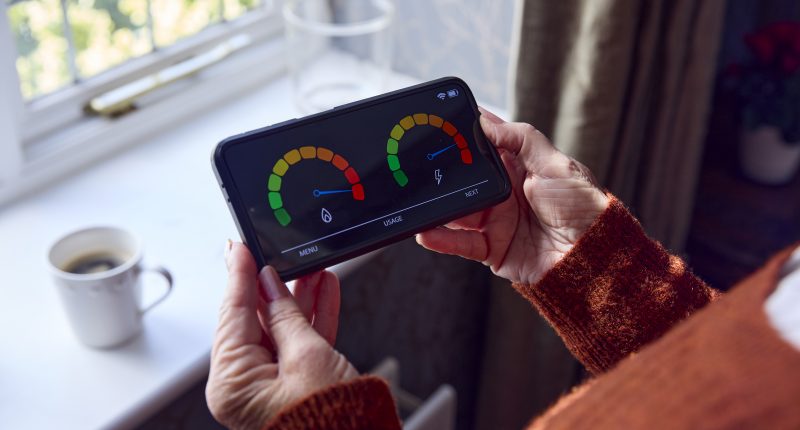MARTIN Lewis has warned you must take an energy meter reading now ahead of a crucial change which could save you £100s.
The Money Saving Expert urged people to take notes of their usage to protect their pockets.
Brits are braced for a new energy price cap starting next Monday affecting gas and electricity bills.
The Ofgem is dropping its price cap by 12.3% from the current £1,928 for a typical dual fuel household in England, Scotland and Wales to £1,690 – a drop of £238 over a year, or around £20 a month.
To ensure users are making the most of it, the financial whizz is urging households to take their meter readings before the price cap hits after the Easter weekend.
All you need to do is to send energy meter readings to your supplier this weekend.
READ MORE ON ENERGY BILLS
The financial guru explained: “If you’ve a working smart meter, you don’t need to do anything.
“If not, try to give an up-to-date meter reading within a few days either side of the rate change to reduce the risk your supplier estimates you’ve used more at the current higher rate than you have.”
The average household on a standard variable tariff (SVT) is expected to spend £127 on energy in April.
This is compared with £205 in March and is due to a combination of cheaper rates and lower usage as the weather warms up.
Most read in Money
If you fail to do this you could end up overpaying when the cheaper prices come into effect.
Martin added: “For extra peace of mind, email yourself a time-stamped pic of the meter.”
Those on SVTs who do not have a smart meter and do not submit meter readings on or around April 1 risk having some of their usage after that date charged at the previous, more expensive rates.
What is the energy price cap?

ENERGY bills are set to fall by £238 a year for millions of households from April.
The energy price cap was first brought in on January 1, 2019, by the regulator Ofgem.
The cap was introduced with the aim of preventing the millions of households then on expensive tariffs from being ripped off.
As it stands, the price cap is updated every quarter, or three months.
The price cap is currently £1,928, the lowest figure since March 2022.
But on February 23, Ofgem announced the price cap from April 1 to June 30 would be £1,690 – a £238 drop.
Bear in mind, the £1,690 figure is calculated based on what Ofgem thinks an average household will use.
This is calculated assuming that a typical household uses 2,700 kWh of electricity and 11,500 kWh of gas over a 12-month period.
From April 1, the price of gas will be cut from 7.42p per kWh to 6.04p.
Meanwhile, the unit rate for electricity will drop from 28.62p per kWh to 24.50p, Ofgem said.
However, the daily standing charge for electricity will go from 53.35p to 60.10p while for gas it will go from 29.60p to 31.43p.
Those who use less will pay less, and those who use more will pay more.
How do I calculate my energy bill?
To calculate how much you pay for your energy bill, you must find out your unit rate for gas and electricity and the standing charge for each fuel type.
The unit rate will usually be shown on your bill in p/kWh.The standing charge is a daily charge that is paid 365 days of the year – irrespective of whether or not you use any gas or electricity.
You will then need to note down your own annual energy usage from a previous bill.
Once you have these details, you can work out your gas and electricity costs separately.
Multiply your usage in kWh by the unit rate cost in p/kWh for the corresponding fuel type – this will give you your usage costs.
READ MORE SUN STORIES
You’ll then need to multiply each standing charge by 365 and add this figure to the totals for your usage – this will then give you your annual costs.
Divide this figure by 12, and you’ll be able to determine how much you should expect to pay each month from April 1.
How to save up on energy bills
WITH the cost of living looming upon us many hard-up Brits are worried about how to make ends meet. Luckily, there are ways to keep the bills down.
1. Take a meter reading: Energy suppliers usually require you to take regular meter readings from your gas and electricity meter to work out how much they should charge you.
2. Check your direct debit: If you pay your energy bill by direct debit, this monthly amount should be “fair and reasonable”. If you don’t think it is, you should complain directly to your supplier in the first instance.
3. Check for any new energy deals: There are currently fixed deals on offer that are priced close to or slightly higher than standard variable tariffs, but they offer peace of mind that your rates will not change for 12 months.
4. Check if you qualify for support: Households should check whether they qualify for energy support schemes or grants. The government runs the Warm Home Discount scheme, which provides £150 in energy credit to help with bills during the winter and has recently introduced the Great British Insulation Scheme.
5. Change your thermostat and boiler settings: Check the temperature on your thermostat and adjust it if required.
6. Change your radiator settings: Get ahead of the first cold spell by checking if your radiators are up to scratch. Bleeding your radiators will prevent cold spots, and you may want to consider turning radiator valves down – or off – in the rooms you use less often.
7. Change the way you use your appliances: Tracking your usage may help you see how changing some habits can make a difference in your home.
8. Check for draughts: Draught-proofing is a quick and cost-effective way to prevent heat escaping, which could save you around £50 a year.











